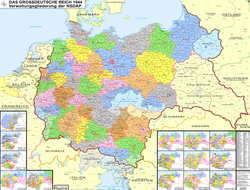Gau Westmark
| Gau Westmark | ||||||
| Gau of Nazi Germany | ||||||
|
||||||
|
||||||
|
Map of Nazi Germany showing its administrative subdivisions (Gaue and Reichsgaue). |
||||||
| Capital | Neustadt an der Weinstraße (1933–1935) Saarbrücken (1935–1945) |
|||||
| Gauleiter | ||||||
| • | 1933–1944 | Josef Bürckel | ||||
| • | 1944–1945 | Willi Stöhr | ||||
| History | ||||||
| • | Establishment | 30 January 1933 | ||||
| • | Disestablishment | 8 May 1945 | ||||
| Today part of |
|
|||||
The Gau Westmark (English: Western March) was an administrative division of Nazi Germany from 1933 to 1945. From 1926 to 1933, it was a regional subdivision of the Nazi Party.
The Nazi Gau (plural Gaue) system was originally established in a party conference on 22 May 1926, in order to improve administration of the party structure. From 1933 onwards, after the Nazi seizure of power, the Gaue increasingly replaced the German states as administrative subdivisions in Germany.
The Gau was originally established in the parts of Bavaria left of the river Rhine, the Palatinate (German:Pfalz). As such, it carried the name Gau Rheinpfalz (English:Rhenish Palatinate). The territory of Oldenburgs Birkenfeld was also annexed to the Gau in 1934. With the return of the Saar Basin to Germany in 1935, the two regions were merged and formed the new Gau Pfalz-Saar. This Gau was renamed Gau Saarpfalz (English:Saar-Palatinate) in 1937.
After the outbreak of the Second World War and the defeat of France in 1940, the French département of Moselle, renamed "CdZ-Gebiet Lothringen", was added to the Gau on 30 November 1940. On 7 December 1940, it was again renamed, now Gau Westmark. Gauleiter Bürckel hoped that Westmark would be extended as far as Germany's future western border, especially keeping in mind the ore region of Briey-Longwy in the département of Meurthe-et-Moselle. Bürckel further laid claims to parts of Alsace and even Baden. The Gau, however, remained as such until the defeat of Germany in 1945.
...
Wikipedia



